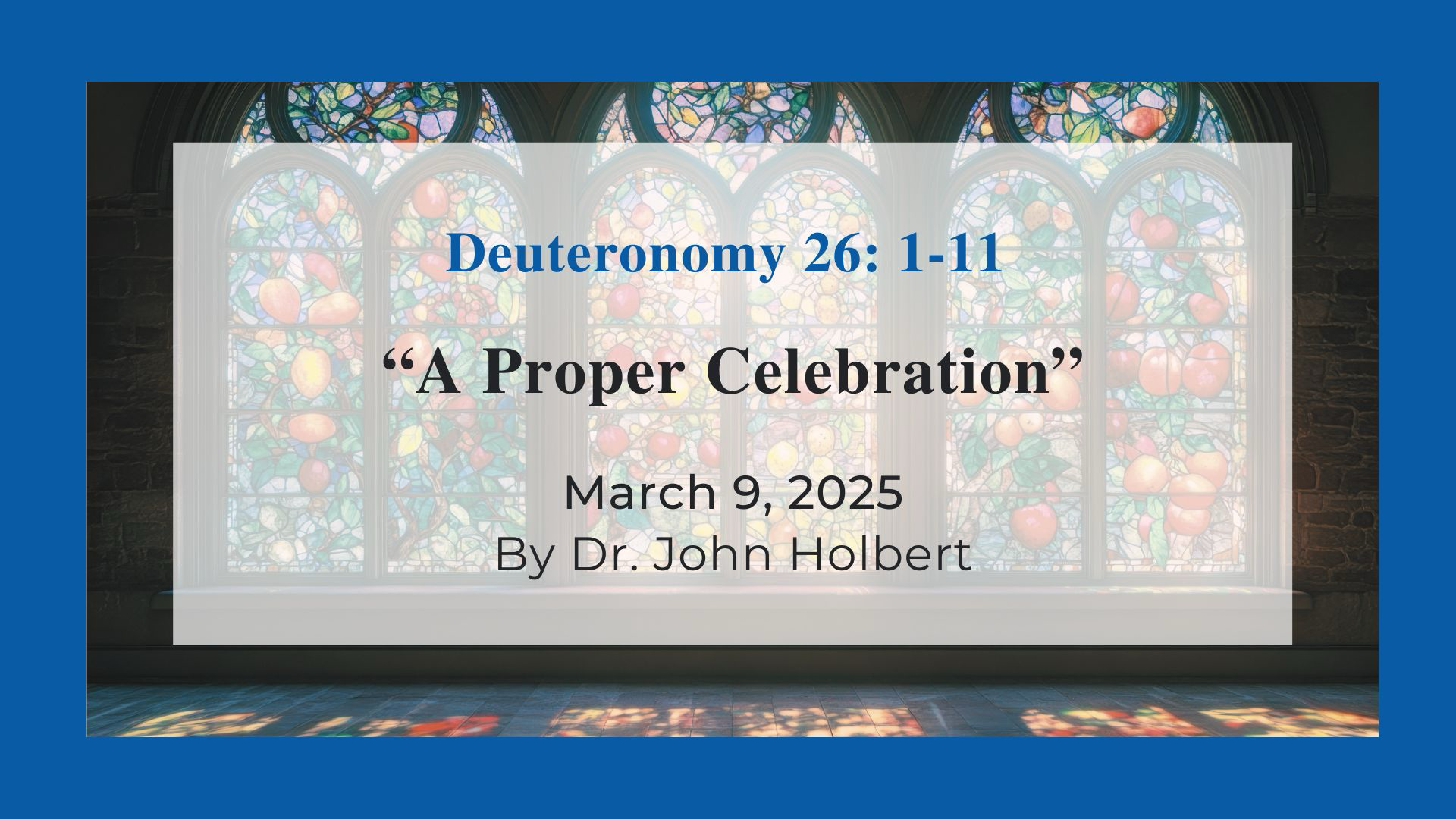A Proper Celebration - Reflections on Deuteronomy 26:1-11, Lent 1, Year C
by John C. Holbert on Sunday, February 2, 2025

It has long been the practice of those who collect the lectionary readings to include Deut.26 as the Hebrew Bible lection for the first Sunday in Lent. This regular choice is worth some reflection. Why this “first fruit” celebration as we enter the season of Lent? Ash Wednesday confronts us with the stark fact of our mortality and also bids us take with great seriousness the demands of God, orienting ourselves to God’s call for our lives toward repentance, a change of heart for all of our sins. But today we are told to do three things as we continue our Lenten journey: offer to God the first fruits of God’s bounty; recite the long story of God’s activity with us; share that bounty with our neighbors, the foreigners, widows, orphans, with any who have no ready access to the bounty YHWH has provided. We might put the divine charge this way: after you have directly confronted your own brief span of life and are aware that God is calling you to use that life for God’s work, then you are provided some instructions about how that work may be done.
The text begins with a clear echo from the book of Genesis. “When you enter the land that YHWH your God is giving you as an inheritance to possess, you shall take some of the first of all the fruit of the soil that you harvest from the land…” (Deut.26:1-2). In Genesis 4:3, the brutal murder of Abel by his brother begins with Cain’s offering to YHWH “some offering of the fruit of the soil” (Gen.4:3), while his brother, Abel, “brought of the very first of his flock, their fat portions” (Gen.4:4). In other words, Abel brought his very best, while Cain’s offering was merely “some,” with the implication that it was a gnarled rutabega he found lying about. Little wonder that YHWH “paid attention to Abel and his offering,” but had no interest in the grudging gift of Cain. The pilgrims who have now entered the land of promise are enjoined to take “the first of all the fruit” and offer it to YHWH by “going to the “priest who is office at the time” (making it very clear that this text was written long after the time of Israel’s coming to the land, a time when the priestly office was well established), give to that priest a basket full of the first fruits, and then speak the history of the people. That history is noteworthy in several ways.
“A wandering Aramean was my ancestor” (Deut.26:5) reads the NRSV, though the word “wandering” can more directly be read “perishing/dying,” suggesting the perilous state of the Israelite forebears. The assumption is that the reference is to Abram as the wandering/perishing one, but he certainly represents the whole people of YHWH, because in the narrative tale we are told “he went down to Egypt and lived there as a foreigner (NRSV reads “alien” but that translation has always struck me as peculiar, rather more Sci-Fi than it needs to be!) few in number, and there became a great nation, strong and populous” (Deut.26:5). Then the Egyptians are accused of “treating us harshly and afflicting us, by imposing hard labor on us.”
Then they cried to YHWH, who brought them out of Egypt “with a mighty hand and outstretched arm, with a terrifying display of power, with signs and wonders, and brought us to this place, a land flowing with milk and honey” (Deut.26:8-9). Note that there is no mention of the Sinai experience: the smoking and flaming mountain, the movement of Moses to speak with God, the building of the molten calf, the fury of YHWH, the gift of the Ten Words. This absence in the story led many 20th century scholars to wonder whether the entire Sinai narrative was a later addition into the narrative, since this “small credo” of the Israelite tale is void of Sinai altogether.
Whether or not that is true, what happens next is crucial. When the pilgrims place their first fruits on the altar, and are ready to celebrate the coming into the land, they are expressly told to celebrate with “the Levites (that is those landless priests) and the foreigners” (Deut.26:11). However, in the very next vs.12, the list of those invited to share in the bounty expands and now includes “Levites, foreigners, orphans and widows so that they may eat their fill within your towns” (Deut.26:12). The addition of widows and orphans to this list is of course fully reminiscent of the famous lists from the prophets who again and again named widows and orphans and foreigners as those in any community who were on society’s margins, and were thus often in desperate need of aid from those who had access to the first fruits. Prophet after prophet enjoined all who would follow YHWH to take special care for these marginalized ones, beginning with 9th century Elijah, and continuing with all those 8th century masters: Amos, Isaiah, Hosea, and Micah. Thus, we may conclude that the Deuteronomic concern for the needy remains powerful in the 7th and 6th centuries as well.
This call of YHWH is no less powerful in the 21st century of our own era. We are still called to share our YHWH-given bounty with those in need. Any who would worship this God must share in the ancient demand for care for the poor by offering gifts from the bounty God has provided. Thus, we begin our Lenten journey with that familiar divine call: care for all of my people, especially those who have so little.
